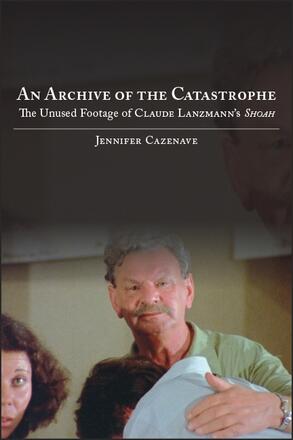
An Archive of the Catastrophe
The Unused Footage of Claude Lanzmann's Shoah
Alternative formats available from:
Comprehensive analysis of 220 hours of outtakes that impels us to reexamine our assumptions about a crucial Holocaust documentary.
Description
Honorable Mention, 2020 Best First Book Award presented by the Society for Cinema and Media Studies
Claude Lanzmann's 1985 magnum opus, Shoah, is a canonical documentary on the Holocaust—and in film history. Over the course of twelve years, Lanzmann gathered 230 hours of location filming and interviews with survivors, witnesses, and perpetrators, which he condensed into a 9½-hour film. The unused footage was scattered and inaccessible for years before it was restored and digitized by the United States Holocaust Memorial Museum. In An Archive of the Catastrophe, Jennifer Cazenave presents the first comprehensive study of this collection. She argues that the outtakes pose a major challenge to the representational and theoretical paradigms produced by the documentary, while offering new meanings of Shoah and of Holocaust testimony writ large. They lend fresh insight into issues raised by the film, including questions of resistance, rescue, refugees, and, above all, gender—Lanzmann's twenty hours of interviews with women make up a mere ten minutes of the finished documentary. As a rare instance of outtakes preserved during the predigital era of cinema, this unused footage challenges us to establish a new critical framework for understanding how documentaries are constructed and reshapes the way we view this key Holocaust film.
To view the book trailer on YouTube, please go to: https://www. youtube. com/watch?v=bBjUWyAn55g
Jennifer Cazenave is Assistant Professor of French at Boston University.
Reviews
"Cazenave's work will be particularly helpful for not only the investigation of the outtakes vis-à-vis the final version of Shoah but also as an example of how to juxtapose film ('archive' and final cut), film criticism, and related literature." — Jewish Film & New Media
"…[this] painstakingly researched, skillfully organized, and thoroughly absorbing study changes our understanding of Shoah and the paradigmatic ethics of representation that it invented." — French Studies
"…[an] illuminating new volume…" — Los Angeles Review of Books
"…a towering achievement…" — Historical Journal of Film, Radio and Television
"…a wonderful and complex study that will be of great interest to readers in Holocaust and cinema studies." — New Books Network
"This book is a must-have for film buffs, and for those who think about how we shape the Holocaust." — Jewish Herald-Voice
"Cazenave's immense work of scholarship and reflection offers an intimate and exacting account of the way Lanzmann's approach to the project shifted and changed over the years of its creation. Never before has there been a more insightful study of the evolution of his thinking. I believe that any scholar who has worked on this film will agree." — Stuart Liebman, editor of Claude Lanzmann's Shoah: Key Essays
"This monumental book will profoundly change our understanding of Shoah and Lanzmann's highly influential shaping of the Holocaust narrative. Cazenave reveals that the significance of Shoah is not only found in what is in it, but, perhaps more importantly, what was omitted from it." — Aaron Kerner, author of Film and the Holocaust: New Perspectives on Dramas, Documentaries, and Experimental Films